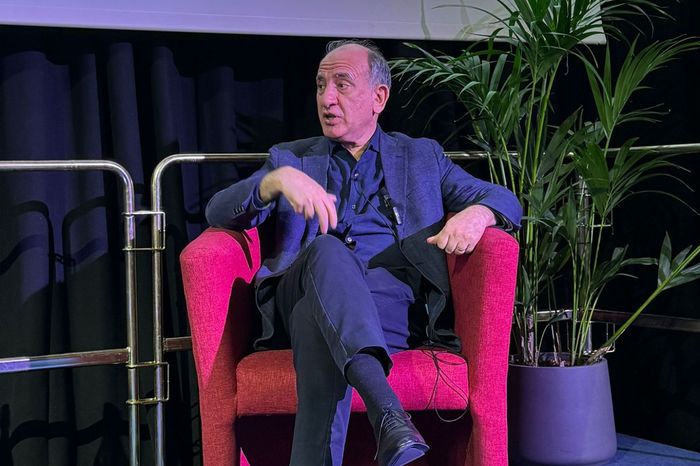Lord Chris Smith on the art of politics, and the politics of the arts
Maddy Browne talks to the Master of Pembroke College about environmental politics, the arts and making change

It is not every day that you interview a former Cabinet minister who can take down a book from his shelf called Gay Icons and flip instinctively to his photo. Lord Chris Smith is far from unnerved by getting his photo taken, and we are back downstairs before the tea gets cold.
The Master’s lodge at Pembroke College overlooks the bowling green, where students are making the most of nice weather. Before I can begin our interview, I realise that a caterpillar is crawling up my leg, after I’d sat on the lawn to have my lunch. Smith quickly offers up a coffee table book (Oscar Wilde, no less) and takes the caterpillar outside. “I always love it when the weather is good enough for students to sit around the bowling green,” he says, “it’s just wonderful to see”. I don’t think the view has changed much since he was an undergraduate at Pembroke; we are still desperate for every bit of sunshine we can get.
It is that view from the Master’s lodge, and the rooms within it, that come to represent Smith’s life, as student, politician, and now Master. He tells me that this room is for his politics books – art books live upstairs, literature in the study. Within the four walls of the lodge, each element of his life is laid out, separate yet always interacting.
“Poetry and literature were my hinterland”
So, which room to visit first? In honour of my adopted caterpillar, I steer us on to Smith’s environmentalism, having previously been head of the Environment Agency. “I wrote the party’s policy document on the environment, which was called ‘In Trust for Tomorrow’,” he says, proudly recounting the catchy title, “we then implemented that.” If only it were still that simple now, when the current Labour party has u-turned on their promise to invest £28bn into environmental protections. When I inquire about this, he tactfully says, “I wish they hadn’t, and I can sort of see why, they’re terrified of saying anything that implies the spending of money.” The dreaded note from 2010, left in the Treasury’s office saying “there’s no money left”, still haunts the Labour party fourteen years later. “But, there is an awful lot you can do towards the green agenda that doesn’t necessarily involve spending money,” he reminds me.
As if visiting another room, Smith moves on to describe the Labour plans for investments in arts and culture. He is currently advising the shadow Culture Minister Thangam Debbonaire ahead of the next election. “She has one incalculable advantage in hoping to take on the role of becoming the Secretary of State,” he informs me: “she used to be a professional cellist.” If only every Cabinet minister was that qualified. “We are together thinking about ways in which cultural activity can be improved, can become more accessible, can be enhanced,” he elaborates, “but without simply assuming that you need more money to do it”.
In the fight for funding, Smith’s pragmatism and experience undoubtedly comes in handy, as would his approach to the cutthroat world of politics. He tells me about the importance of having a “hinterland” – something “Denis Healey, the former deputy leader of the Labour Party, used to say”. This means “something other than politics which MPs were absorbed by and engaged with”. For Debbonaire, this is music; for her adviser, “poetry and literature were my hinterland” he says. I take this as an official excuse to spend as much time writing poems and articles as essays.
“Despite the importance of the arts, money is running out once again”
Despite the importance of the arts, money is running out once again, with the government recently announcing more cuts to higher education funding for arts degrees. For Smith, the solution lies much earlier than that. “Why can’t we guarantee every school pupil in every school in the country, each year, the opportunity to have a special cultural experience?” he explains passionately. He describes how, “whether it’s going on a visit to a museum, or going to see a play, or learning how to play a musical instrument, that’s not going to cost a fortune.” The future rests on whether those kids who want to star in films or direct plays can continue their education beyond secondary school.
It is difficult to reckon with, when the climate crisis, disappearing funding and reactionary attacks on LGBTQ+ rights dominate the news. The resounding message I get from Smith is that the changes like these will still only happen “step by step”. Even with past legislation like Section 28 and the current echoes of its rhetoric, he stands by his incrementalism. “Success doesn’t come in an easy straight line.”
After listening to his anecdotes about parliamentary life, the one that sticks with me the most features “a particularly neanderthal Tory, Nicholas Winterton, that was making a speech” in favour of Section 28. The MP had stood up to reply to Smith but had admitted that “the House had learned to listen to the Honourable Gentleman with respect”. As he explains, Winterton “was no longer able to talk about LGBT people in massively generalised terms because there, sitting in front of him, was one of the people he was talking about.” Smith’s presence as an MP “showed we had made a little bit of progress”. As more and more LGBTQ+ MPs enter the Commons, draft environment law, and protect the arts, there is change to be made, ushered in by people like Smith.
 News / Hundreds of Cambridge academics demand vote on fate of vet course20 February 2026
News / Hundreds of Cambridge academics demand vote on fate of vet course20 February 2026 News / Judge Business School advisor resigns over Epstein and Andrew links18 February 2026
News / Judge Business School advisor resigns over Epstein and Andrew links18 February 2026 News / University Council rescinds University Centre membership20 February 2026
News / University Council rescinds University Centre membership20 February 2026 News / Petition demands University reverse decision on vegan menu20 February 2026
News / Petition demands University reverse decision on vegan menu20 February 2026 News / Caius students fail to pass Pride flag proposal20 February 2026
News / Caius students fail to pass Pride flag proposal20 February 2026










